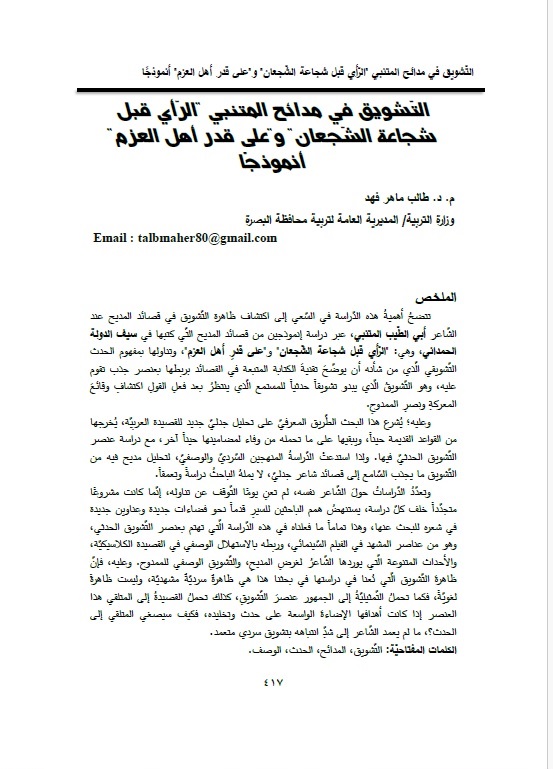The Suspense in the Praises of Al-Mutanabbi "The opinion before the courage of the brave "Using "On the status of the people of determination as a sample"
Main Article Content
Abstract
The importance of this study is evident in seeking to discover the phenomenon of suspense in the praise poems of the poet Abi al-Tayyib al-Mutanabbi, through the study of two models of praise poems that he wrote during the reign of Saif al-Dawla al-Hamdani, namely: "opinion before the courage of the brave" and "according to the status of the people of determination". The research dealt with it focusing on the concept of suspenseful event, which would clarify the writing technique used in the poems by linking them to an element of attraction on which they are based, it seems to be a suspense event for the listener who awaits after the act of saying the discovery of the facts of a battle and the victory of the praised one.
Accordingly; This research embarks on the epistemological path on a new dialectical analysis of the Arabic poem, which free it from the old rules at one time keeps it faithful to its contents, while studying the element of modern suspense it covers. Therefore, the study called for the narrative and descriptive approaches to analyze praise in which there is suspense that attracts the listener to the poems of a dialectical poet. The researcher does not tire of studying and in-depth.
The multiplicity of the studies on the poet himself did not mean that one should stop dealing with him. Rather, there were a renewed project behind each study for motivating researchers to move forward towards new spaces and new titles in his poetry to search for them. With the descriptive intro in the classic poem, the various events that the poet mentions for the purpose of praise, and the descriptive suspense of the praised one.
Article Details

This work is licensed under a Creative Commons Attribution-ShareAlike 4.0 International License.
References
قائمة المصادر والمراجع
العربية
ـ ألف ليلة وليلة تحليل سيميائي تفكيكي، عبد المالك مرتاض، الجزائر: ديوان المطبوعات، 1993.
ـ بنية النّص السّردي، حميد لحميداني، الدّار البيضاء: المركز الثّقافي العربي، ط1، 1991.
ـ جماليّة السّرد في الخطاب الرّوائي، صبيحة عودة زعرب، عمان: دار مجداوي للنشر والتّوزيع،ط1، 2006.
ـ دراما الشّاشة بين النّظرية والتّطبيق للسّينما والتّلفزيون، حسين حلمي المهندس، القاهرة: الهيئة العامّة المصرية للكتاب.
ـ العصر العباسي، شوقي ضيف، بيروت: دار الرّاتب الجامعيّة، د.ت، د.ط.
ـ القاموس المحيط، محمد بن يعقوب الفيروزآبادي، بيروت: دار إحياء التّراث العربي، د.ت، د.ط.
ـ المتنبي، عبد الرّحمن المصطاوي، بيروت: دار المعرفة، 2013، ط8.
ـ مدخل إلى نظرية القصّة، سمير المرزوقي، وجميل شاكر، الرباط: الدّار التّونسيّة للنشر، 1985.
ـ مختار الصّحاح، محمد بن أبي بكر بن عبد القادر الرّازي، د.ت، د.ط.
ـ المديح في الشّعر العربي، سراج الدّين محمد، بيروت: دار المعارف، د.ت، د.ط.
ـ معالم سيميائيّة في مضمون الخطاب السّردي، نادية بوشفرة، الجزائر: دار الأمل للطباعة والنّشر، د.ت.، د.ط.
ـمعجم مقايس اللّغة، أحمد بن فارس، تحقيق عبد السّلام هارون، بيروت: دار الجيل، د.ت، د.ط.
ـ موسوعة التّاريخ الإسلامي "العصر العباسي"، خالد عزام، عمان: دار أسامة للنّشر والتّوزيع، 2009.
ـ لسان العرب، ابن منظور، تحقيق أمين محمد عبد الوهاب ومحمد الصّادق العبيدي، بيروت: مؤسّسة التّرات، د.ت، د.ط.
